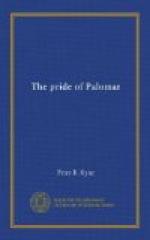“You are very kind.” And Don Miguel thrust the telegram, unopened, into his pocket. “However,” he continued, “it will please me, Moreno, if you accept this slight token of my appreciation.” And he handed the messenger a five-dollar bill. The don was a proud man, and disliked being under obligation to the Tony Morenos of this world. Tony protested, but the don stood his ground, silently insistent, and, in the end, the other pouched the bill, and rode away. Don Miguel seated himself once more beside his retainer and drew forth the telegram.
“It must be evil news,” he murmured, with the shade of a tremor in his musical voice; “otherwise, that fellow could not have felt so much pity for me that it moved him to decline a gratuity.”
“Read, Don Miguel!” Pablo croaked. “Read!”
Don Miguel read. Then he carefully folded the telegram and replaced it in the envelope; as deliberately, he returned the envelope to his pocket. Suddenly his hands gripped the bench, and he trembled violently.
“Don Mike is dead?” old Pablo queried softly. He possessed all the acute intuition of a primitive people.
Don Miguel did not reply; so presently Pablo turned his head and gazed up into the master’s face. Then he knew—his fingers trembled slightly as he returned to work on the hondo, and, for a long time, no sound broke the silence save the song of an oriole in the catalpa tree.
Suddenly, the sound for which old Pablo had waited so long burst forth from the sage-clad hillside. It was a cock quail calling, and, to the majordomo, it seemed to say: “Don Mike! Come home! Don Mike! Come home!”
“Ah, little truant, who has told you that you are safe?” Pablo cried in agony. “For Don Mike shall not come home—no, no—never any more!”
His Indian stoicism broke at last; he clasped his hands and fell to his knees beside the bench, sobbing aloud.
Don Miguel regarded him not, and when Pablo’s babbling became incoherent, the aged master of Palomar controlled his twitching hands sufficiently to roll and light a cigarette. Then he reread the telegram.
Yes; it was true. It was from Washington, and signed by the adjutant-general; it informed Don Miguel Jose Farrel, with regret, that his son, First Sergeant Miguel Jose Maria Federico Noriaga Farrel, Number 765,438, had been killed in action in Siberia on the fourth instant.
“At least,” the old don murmured, “he died like a gentleman. Had he returned to the Rancho Palomar, he could not have continued to live like one. Oh, my son, my son!”
He rose blindly and groped his way along the wall until he came to the inset gate leading into the patio; like a stricken animal retreating to its lair, he sought the privacy of his old-fashioned garden, where none might intrude upon his grief.
II
First Sergeant Michael Joseph Farrel entered the orderly-room and saluted his captain, who sat, with his chair tilted back, staring mournfully at the opposite wall.




